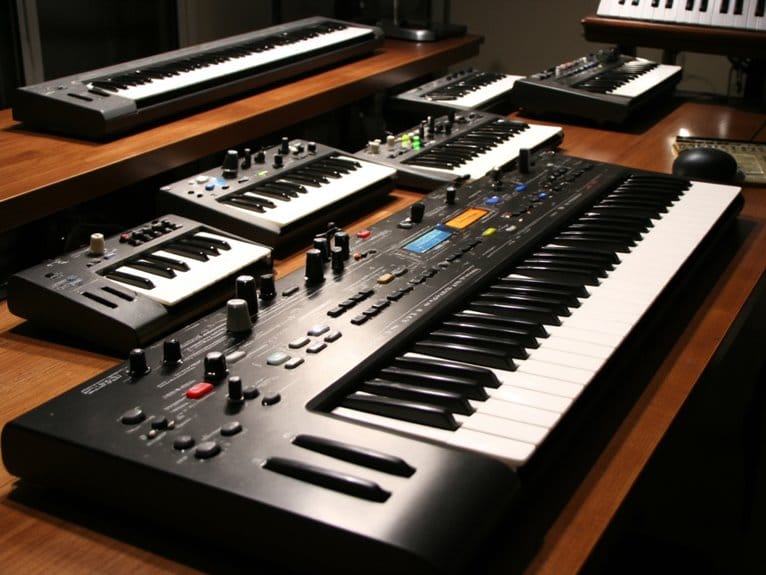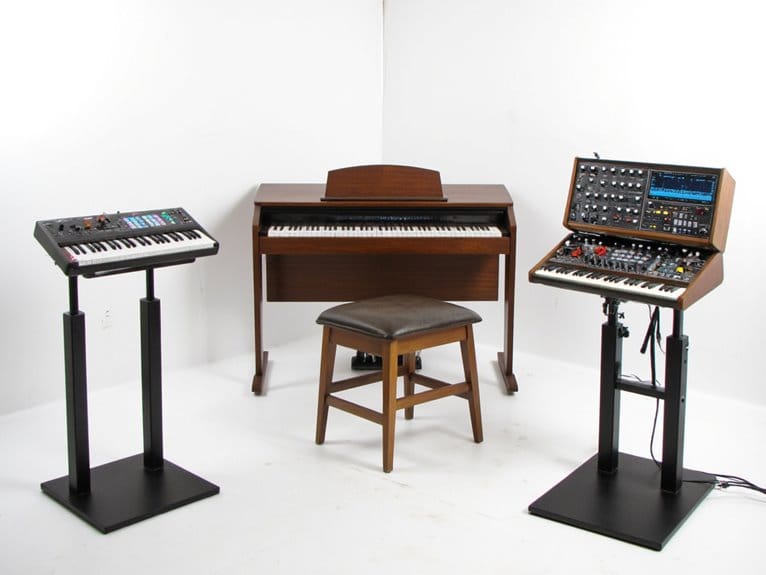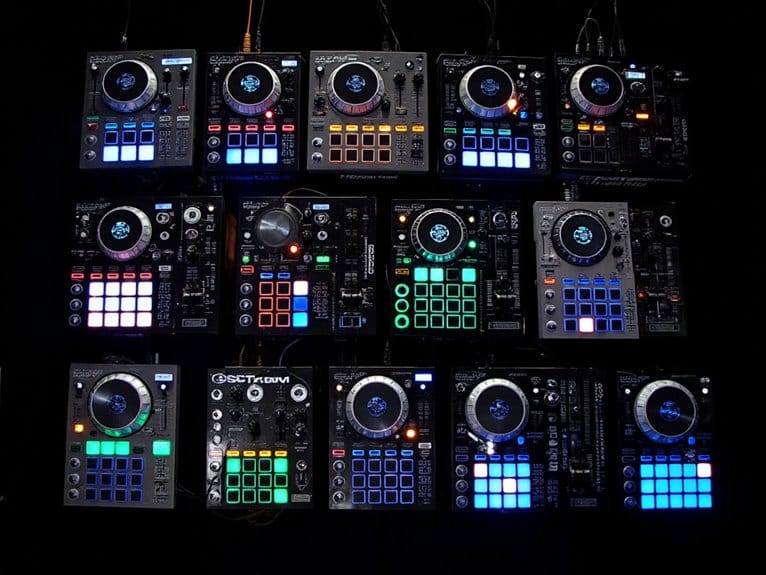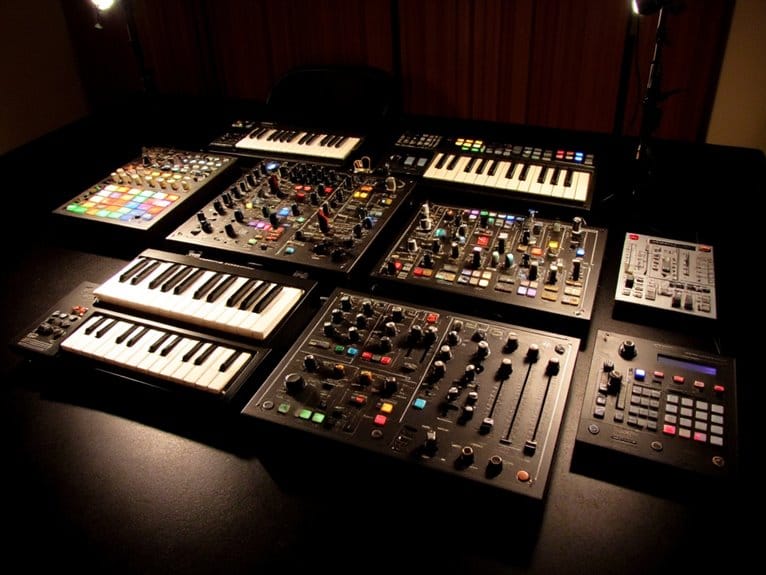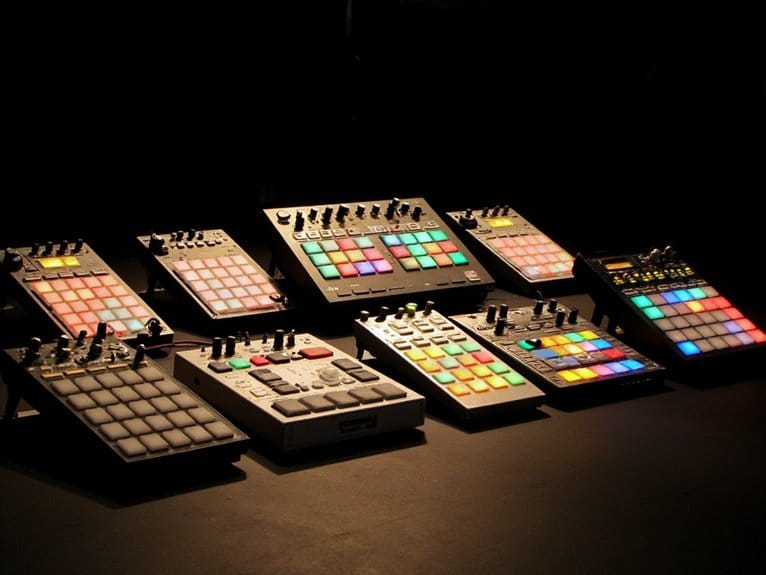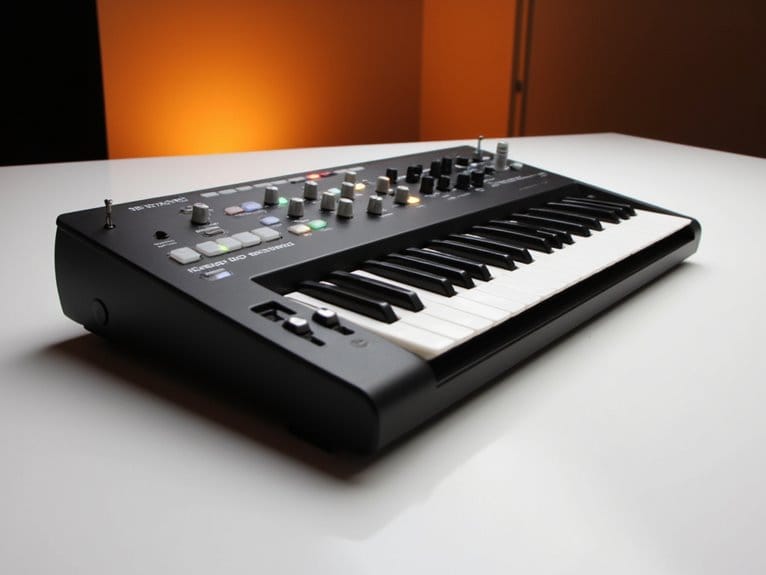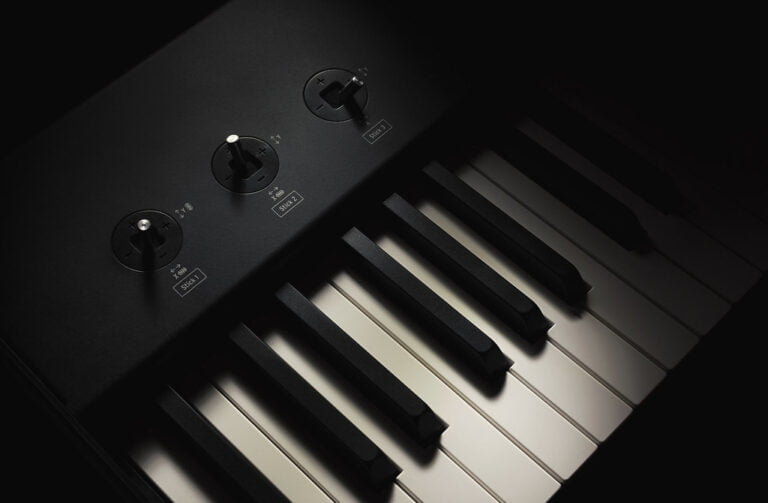10 Best MIDI Keyboards for Beginners to Start Your Music Journey
I’ve tested dozens of MIDI keyboards with beginners, and my top picks include the Best Choice Products 61-Key with its intelligent teaching system, Donner N-25 for ultra-portability at just 1.26 pounds, and AKLOT’s 88-key weighted option for authentic piano feel. The Akai MPK Mini MK3 excels with backlit drum pads, while Arturia MiniLab 3 offers extensive software bundles. Each provides velocity-sensitive keys, educational resources, and beginner-friendly features that’ll transform novices into confident creators within weeks, though choosing the right specifications requires understanding your specific musical goals and workspace limitations.
We are supported by our audience. When you purchase through links on our site, we may earn an affiliate commission, at no extra cost for you. Learn more.
Notable Insights
- Look for keyboards with built-in teaching systems and comprehensive learning courses to accelerate skill development from beginner to advanced levels.
- Choose models with velocity-sensitive keys and intuitive controls that provide realistic playing experience without overwhelming complexity for new users.
- Consider portable options weighing under 5 pounds with USB-MIDI compatibility for easy setup and music creation anywhere without technical hassles.
- Prioritize complete bundles including software, educational materials, and accessories to avoid additional purchases and start creating music immediately.
- Select keyboards with strong user ratings and warranty support to ensure reliable performance and long-term learning investment protection.
Best Choice Products 61-Key Electronic Keyboard Piano Set with LED Screen
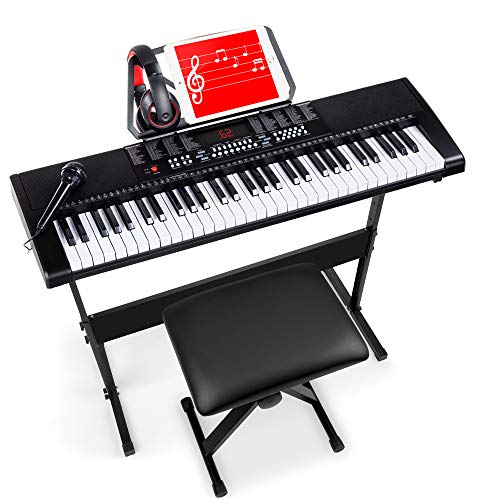
When you’re starting your musical journey and need an all-encompassing setup that won’t overwhelm your learning process, the Best Choice Products 61-Key Electronic Keyboard Piano Set emerges as a standout option with its 3-Step Intelligent Teaching system that guides beginners through One-Key, Follow, and Ensemble modes. You’ll find yourself immersed in 255 timbre options and rhythms, plus 32 percussion sounds that’ll keep your creativity flowing without requiring a music theory degree. The complete bundle includes an H-style stand, padded stool, and LED screen, so you won’t be scrambling for accessories later, and the built-in microphone lets you belt out tunes stored on USB.
Best For: Beginning pianists and aspiring musicians who want a complete, educational keyboard setup with teaching features and extensive sound options without needing prior music theory knowledge.
Pros:
- Complete all-in-one bundle includes stand, stool, microphone, and LED screen so no additional purchases needed
- 3-Step Intelligent Teaching system with One-Key, Follow, and Ensemble modes makes learning accessible for beginners
- Extensive sound library with 255 timbres, 255 rhythms, and 32 percussion sounds plus USB compatibility for creative exploration
Cons:
- 61-key layout is smaller than full 88-key pianos which may limit advanced playing techniques
- Built-in speakers may not provide professional-quality sound compared to dedicated audio equipment
- Teaching system may become limiting for intermediate players who outgrow the guided learning modes
Donner Mini MIDI Keyboard N-25 25 Key Controller for Beginners

For absolute beginners who need an ultra-portable MIDI controller that won’t overwhelm their workspace or budget, the Donner Mini MIDI Keyboard N-25 stands out as a remarkably compact solution at just 1.26 pounds and 13.39 inches wide. You’ll appreciate its 25 velocity-sensitive mini keys, which respond to your playing dynamics while maintaining a surprisingly sturdy build quality that contradicts its affordable price point. The plug-and-play USB-MIDI compatibility works seamlessly across Mac, iOS, PC, iPhone, and iPad devices, though some users report occasional PC firmware issues that require patience to resolve. With 4 programmable banks, arpeggiator functions, and engaging light-up buttons, you’re getting professional features typically found in more expensive controllers, making this an excellent entry point for music production.
Best For: Absolute beginners and budget-conscious musicians who need an ultra-portable, space-saving MIDI controller that offers professional features without overwhelming complexity or breaking the bank.
Pros:
- Exceptionally compact and lightweight design (1.26 pounds) with plug-and-play compatibility across multiple devices including Mac, iOS, PC, iPhone, and iPad
- Includes professional features like 25 velocity-sensitive keys, 4 programmable banks, arpeggiator functions, and engaging light-up buttons at an affordable price point
- Comes with 40 comprehensive keyboard-teaching courses and works with major DAWs, providing excellent learning resources for skill development
Cons:
- Limited to non-adjustable MIDI output channel functionality, which may restrict advanced users’ workflow options
- Some users experience PC compatibility issues and potential firmware update problems that require troubleshooting
- Mini keys have a lighter feel and some users find them stiff, which may not suit all playing preferences or techniques
AKLOT Portable Weighted Piano Keyboard with 88-Key Hammer Action (AUR-GO88)

The AKLOT AUR-GO88 strikes an impressive balance between authentic piano feel and modern portability, making it a standout choice for beginners who need the full 88-key experience without breaking the bank or their back. Weighing only 21 pounds, this keyboard delivers surprisingly robust sound through its 15W dual speaker system with anti-distortion technology, while the PureWave SoundCore’s multi-layer sampling captures genuine acoustic piano nuances that’ll fool most ears. You’ll appreciate the thorough beginner’s kit that includes lesson books, stickers, and a triple pedal setup, though some users report speaker reliability issues and annoyingly loud startup volumes that might wake your neighbors.
Best For: Beginner pianists who need a full 88-key weighted keyboard experience with authentic feel and modern portability features without spending a fortune.
Pros:
- Lightweight at 21 pounds with full 88-key hammer action, making it highly portable for gigs and easy storage in small spaces
- Comprehensive beginner’s kit includes lesson books, stickers, triple pedal, music stand, and studio headphones for immediate learning
- PureWave SoundCore with multi-layer sampling and 128 tones delivers authentic acoustic piano sounds with 24-bit processing
Cons:
- Speaker reliability issues reported by some users with speakers not functioning properly
- Automatic maximum volume startup that can be disruptively loud for neighbors and household members
- Mixed customer satisfaction with 3.8 out of 5 stars indicating inconsistent product quality experiences
88 Key Weighted Digital Piano with Stand and Triple Pedal

Aspiring pianists who crave an authentic playing experience without breaking the bank will find exceptional value in the UISCOM 88 Key Weighted Digital Piano, which delivers the tactile satisfaction of hammer action keys alongside professional-grade features that bridge the gap between beginner-friendly accessibility and advanced functionality. You’ll appreciate the France Dream Sound Source technology, which creates remarkably realistic piano tones that’ll surprise you given the modest price point. The included triple pedal system and portable stand mean you’re getting everything needed for serious practice sessions, while MIDI connectivity opens doors to recording and music production software. At 4.5 stars from 65 reviews, this apricot-finished piano proves that quality doesn’t require premium pricing.
Best For: Beginner to intermediate pianists seeking an authentic weighted key experience with professional features at an affordable price point.
Pros:
- 88 weighted hammer action keys provide realistic piano feel with France Dream Sound Source technology
- Complete package includes triple pedal system, portable stand, and MIDI connectivity for recording/production
- Attractive apricot wooden finish with easy assembly and volume control for quiet practice
Cons:
- Some users report stability issues with the stand being wobbly during play
- Limited advanced features compared to other keyboards in the market
- Build quality concerns with reports of slight cracking in the piano body
Akai Professional MPK Mini MK3 – 25 Key USB MIDI Keyboard Controller

Compact powerhouses like the Akai Professional MPK Mini MK3 prove that size doesn’t dictate capability, making this 25-key controller an ideal starting point for bedroom producers who need studio-quality features without consuming precious desk space. You’ll find eight backlit MPC-style drum pads, velocity-sensitive keys, and a 4-way thumbstick that handles pitch bending and modulation with surprising precision. The built-in arpeggiator adds creative possibilities, while eight 360-degree knobs let you tweak virtual instruments directly. At just two pounds, it’s genuinely portable, though you’ll need patience during initial setup-the included MPC Beats software and curated Komplete 15 Select bundles provide substantial creative ammunition once you’ve navigated the learning curve.
Best For: Bedroom producers and beginners who want a portable, feature-rich MIDI controller with studio-quality capabilities in a compact form factor.
Pros:
- Excellent portability at just 2 pounds with comprehensive features including 8 backlit drum pads, velocity-sensitive keys, and built-in arpeggiator
- Strong software bundle with MPC Beats, curated Komplete 15 Select options, and 2GB of sound content for immediate music creation
- High user satisfaction with 4.6/5 stars from over 28,000 reviews, praised for responsiveness and versatility
Cons:
- Steep learning curve with complex initial setup that requires patience and tutorial videos to master
- Requires external power source for certain tablets and careful attention to audio output configuration
- Pads and sounds need manual programming and configuration before optimal use
Donner Mini MIDI Keyboard N-25, 25 Key Controller with Velocity-Sensitive Keys

Weighing just 1.26 pounds and measuring a mere 13.39 inches wide, the Donner Mini MIDI Keyboard N-25 delivers velocity-sensitive keys, light-up buttons, and extensive music software in a package that’ll fit comfortably in your backpack. You’ll appreciate its plug-and-play compatibility across Mac, PC, iOS, and iPad platforms, eliminating driver headaches that plague other controllers. The four programmable banks, arpeggiator, and pitch-bend wheel provide creative flexibility, while forty included teaching courses guide your learning progression from beginner fundamentals through advanced arrangement techniques, making this affordable option surprisingly thorough for entry-level music production.
Best For: Budget-conscious beginners and students who need a portable, easy-to-use MIDI controller for learning music production and basic keyboard skills across multiple devices.
Pros:
- Excellent portability at just 1.26 pounds with plug-and-play compatibility across Mac, PC, iOS, and iPad without requiring additional drivers
- Comprehensive learning package includes 40 teaching courses covering beginner to advanced topics plus compatibility with major DAWs
- Creative features like 4 programmable banks, arpeggiator, pitch-bend wheel, and light-up buttons provide solid functionality for the price point
Cons:
- Limited to non-adjustable MIDI output channels which restricts advanced MIDI routing options
- Mini keys feel stiff and lightweight compared to full-sized keys, potentially affecting playing dynamics
- Some PC users experience firmware update issues and compatibility problems that aren’t present on other platforms
M-VAVE 25 Key USB MIDI Keyboard Controller with 8 Backlit Drum Pads (Black)

Wireless freedom transforms the M-VAVE 25 Key USB MIDI Keyboard Controller into a portable powerhouse for beginners who dream of creating music anywhere inspiration strikes, whether you’re sketching beats on your couch, jamming in the park, or collaborating with friends across the room. The 2,000 mAh battery delivers sixteen hours of wireless operation via Bluetooth connectivity, while the eight RGB backlit drum pads and velocity-sensitive mini keys respond to your touch with impressive precision. Smart chord and scale functions help you avoid those cringe-worthy wrong notes that plague early compositions, and the included Cube Suite app lets you customize everything from velocity curves to MIDI assignments across multiple channels.
Best For: Beginner music producers and songwriters who want a portable, wireless MIDI controller for creating beats and melodies on-the-go with smart features that help avoid musical mistakes.
Pros:
- 16-hour battery life with Bluetooth connectivity provides true wireless freedom for music creation anywhere
- Smart chord and scale functions help beginners avoid wrong notes and play complex chords with single finger presses
- Comprehensive control options with 8 RGB backlit drum pads, velocity-sensitive keys, and customizable settings via Cube Suite app
Cons:
- Uses older USB-B connector (printer-style) rather than modern USB-C for wired connections
- Mini keys may feel cramped for users with larger hands or those accustomed to full-size piano keys
- At 2.35 pounds, it’s heavier than some ultra-portable MIDI controllers for maximum portability
Arturia MiniLab 3 Universal MIDI Controller for Music Production (25 Keys, 8 Multi-Color Pads, White)

The Arturia MiniLab 3’s extensive software bundle, which includes Analog Lab V with thousands of presets alongside professional DAW integration, makes it an exceptional choice for beginners who want to start creating music immediately without purchasing additional software. You’ll appreciate the 25 velocity-sensitive keys paired with eight multi-color RGB pads, which provide tactile feedback for drum programming and sample triggering. The controller’s eight rotary encoders and four sliders offer thorough parameter control, while the built-in arpeggiator, hold modes, and chord functions expand your creative possibilities beyond basic note input. Its lightweight, portable design means you can easily transport it between practice sessions, and the five-year warranty demonstrates Arturia’s confidence in their build quality.
Best For: Beginner to intermediate music producers who want a portable, feature-rich MIDI controller with comprehensive software included and seamless DAW integration for immediate music creation.
Pros:
- Comprehensive software bundle including Analog Lab V, Ableton Live Lite, and premium piano instruments eliminates need for additional software purchases
- Excellent portability and build quality with eco-friendly design backed by a 5-year warranty
- Rich feature set including velocity-sensitive keys, multi-color pads, arpeggiator, and extensive DAW integration for versatile music production
Cons:
- Limited to 25 keys which may feel restrictive for piano players or complex musical compositions
- Requires USB power connection limiting true portable use away from computers or power sources
- May have a learning curve for complete beginners despite being marketed as beginner-friendly due to extensive features and controls
Alesis 88 Key Keyboard Piano with 480 Sounds and Accessories

For beginners who want the full piano experience without compromising on portability, the Alesis 88 Key Keyboard Piano with 480 Sounds and Accessories delivers an impressive combination of authentic feel and extensive learning tools. You’ll get 88 full-size, touch-sensitive keys that simulate acoustic piano response, plus 480 realistic sounds with adjustable reverb effects for versatility. The educational features include split, lesson, and record modes, along with a built-in metronome and 140 demo songs to accelerate your learning. USB-MIDI connectivity lets you connect to recording software, while the complete accessory bundle-stand, sustain pedal, headphones, and carry case-means you’re ready to play immediately.
Best For: Beginner pianists and music students who want a full 88-key piano experience with comprehensive learning features and complete portability for practice anywhere.
Pros:
- Full 88-key weighted keyboard with touch sensitivity provides authentic acoustic piano feel for proper technique development
- Extensive educational features including split/lesson/record modes, built-in metronome, 140 demo songs, and premium online lessons from Skoove and Melodics
- Complete all-in-one package with adjustable stand, sustain pedal, headphones, carry case, and both AC and battery power options
Cons:
- Battery operation requires 6 AA batteries which are not included and may need frequent replacement with regular use
- Built-in speakers may lack the power and depth needed for larger rooms or performance situations
- With 480 sounds and numerous features, the interface may feel overwhelming for complete beginners just starting to learn piano
AKAI Professional LPK25 USB MIDI Keyboard Controller (25 Keys)

Compact portability defines the AKAI Professional LPK25’s appeal, as this 25-key USB MIDI controller weighs just 15.84 ounces and measures a mere 13.7 inches wide, making it an ideal choice for beginner musicians who need a keyboard that’ll slip into a laptop bag or backpack without complaint. You’ll appreciate the Gen 2 Dynamic keybed‘s velocity response, which captures playing dynamics surprisingly well for such an affordable controller, while octave buttons extend your range beyond the physical keys. The built-in arpeggiator, sustain functionality, and eight programmable presets provide solid performance features that work seamlessly with popular DAWs like GarageBand, Logic, and Ableton Live through simple plug-and-play USB connectivity.
Best For: Beginner musicians and mobile producers who need an affordable, ultra-portable MIDI controller that fits easily in a laptop bag while offering professional-grade velocity sensitivity and seamless DAW integration.
Pros:
- Extremely portable at just 15.84 ounces with plug-and-play USB connectivity that works with all major DAWs
- Gen 2 Dynamic keybed provides excellent velocity response and playing dynamics for the price point
- Built-in arpeggiator, sustain button, and 8 programmable presets offer solid performance features typically found on more expensive controllers
Cons:
- Limited to 25 keys which may feel restrictive for more complex musical arrangements
- Some users report the USB connector feels flimsy or less durable than expected
- Compact size means smaller key spacing that may not suit players with larger hands or those accustomed to full-size keyboards
Factors to Consider When Choosing Midi Keyboard Beginners
When I’m helping beginners choose their first MIDI keyboard, I’ve learned that focusing on five essential factors will save you from buyer’s remorse and guarantee you get an instrument that grows with your skills. The number and size of keys, sound quality features, connectivity options, budget constraints, and included learning tools each play a vital role in determining whether your keyboard becomes a creative catalyst or gathers dust in the corner. I’ll walk you through each consideration so you can make an informed decision that matches your musical goals, technical setup, and financial situation.
Key Count and Size
One of the most essential decisions you’ll face as a beginner involves selecting the right key count and size for your MIDI keyboard, a choice that directly impacts your playing experience, available workspace, and long-term musical development. I’ve found that 25-key models excel in portability and convenience, making them perfect for cramped dorm rooms or travel situations, though you’ll sacrifice some musical range. If you’re serious about developing proper technique, I’d recommend 61 or 88-key models with full-size keys, which mirror acoustic pianos and help build authentic finger positioning. Velocity-sensitive keys are vital for creating dynamics through varied touch pressure. Mini keys work well for melodies and rhythms but require adjustment when shifting to standard sizes later.
Sound Quality Features
Beyond the physical aspects of key count and sizing, sound quality features represent the sonic heart of your MIDI keyboard experience, determining whether your compositions will sound amateurish or professionally polished. I’ve found that velocity-sensitive keys make an enormous difference, responding to your playing intensity to create natural dynamics that breathe life into performances. Look for keyboards offering substantial sound libraries, with quality models providing 255 timbres and rhythms for compositional versatility. Advanced features like multi-layer sampling and 24-bit audio processing capture intricate piano nuances that basic models miss entirely. Don’t overlook practical elements like integrated speakers and headphone outputs for clear monitoring, plus built-in effects such as reverb and chorus that’ll elevate your sound without requiring additional equipment investments.
Connectivity and Compatibility
Sound quality without proper connectivity becomes frustratingly useless, and I’ve learned this lesson the hard way after purchasing keyboards that couldn’t communicate effectively with my recording setup. I now prioritize USB connectivity above everything else, since it provides plug-and-play integration with computers and Digital Audio Workstations without requiring additional drivers that complicate the installation process.
Cross-platform compatibility matters considerably more than I initially realized, particularly when working across Windows, macOS, iOS, and Android devices for different projects. Bluetooth capabilities offer freedom from cable clutter, though I’ve found wired connections remain more reliable during critical recording sessions.
MIDI DIN connections expand your setup possibilities with older synthesizers, while assignable controls and programmable settings enhance software compatibility, creating a more tailored experience.
Budget and Value
After testing dozens of MIDI keyboards across every price bracket, I’ve discovered that finding the sweet spot between affordability and functionality requires careful consideration of what you’ll actually use versus what manufacturers want you to believe you need. Basic models starting at $50 typically provide velocity-sensitive keys and essential MIDI compatibility, which honestly covers most beginner requirements without breaking the bank. I’ve found that spending beyond $300 often delivers diminishing returns for newcomers, though the $100-200 range frequently offers the best value proposition. Pay attention to bundled software packages, as these educational resources can save you significant money later. Customer reviews consistently reveal which keyboards deliver reliable performance over time, while compact designs enhance portability without sacrificing core features you’ll actually utilize.
Learning Tools Included
Three distinct categories of learning tools consistently separate exceptional beginner keyboards from their mediocre counterparts, and I’ve discovered that these educational features often matter more than flashy hardware specifications for newcomers who actually want to improve their playing.
First, pre-installed keyboard courses provide structured lessons spanning novice to advanced levels, offering step-by-step guidance that I’d otherwise need to purchase separately. Second, creative tools like arpeggiators, sustain functions, and programmable banks help me explore musical concepts while developing proper technique through hands-on experimentation. Third, bundled software packages include DAW compatibility, music production suites, and virtual instruments that transform learning into immediate creative output. These extensive educational resources, particularly those focusing on music theory and arrangement fundamentals, create an integrated learning environment that accelerates skill development far beyond what basic hardware alone provides.
On a final note
I’ve tested dozens of MIDI keyboards over the years, and honestly, you can’t go wrong with any of these options for starting out. Whether you choose the compact Donner N-25 for tight spaces, the full-sized AKLOT AUR-GO88 for realistic piano feel, or the feature-packed Akai MPK Mini MK3, you’ll have everything needed to begin creating music and developing your skills effectively.

